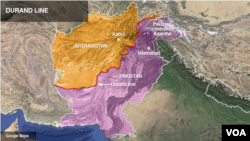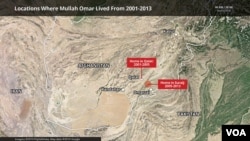Officials in Afghanistan are rejecting a new investigative report published in English that claims the founder of the Taliban, Mulllah Mohammad Omar, spent his final years in Afghanistan, not in neighboring Pakistan.
Washington and Afghan officials have long asserted that Omar took refuge in Pakistan after a U.S.-led military coalition dislodged the Taliban from power in Kabul for harboring al-Qaida leaders accused of orchestrating the Sept. 2001 terrorist attacks.
“The story that emerges is that the U.S., and almost everyone else, had it wrong,” says a report published by New York-based think tank Zomia Center.
The report by Zomia is based on a the primary findings in a book by independent journalist Bette Dam, "Searching for an Enemy," which was published in Dutch in February. Dam has reported from Afghanistan since 2006.
“After 2001, Mullah Omar never stepped foot in Pakistan, instead opting to hide in his native land — and for eight years, lived just a few miles from a major U.S. Forward Operating Base that housed thousands of soldiers,” the report said.
The Zomia Center, an initiative of Arizona State University’s Center on the Future of War and the Washington-based nonpartisan New America think tank, said its research is based on interviews with current and former Afghan government officials. The report said the authors also spoke with members of the Afghan intelligence agency, National Directorate of Security (NDS).
U.S. officials had no comment on the report.
“We strongly reject this delusional claim and we see it as an effort to create and build an identity for the Taliban and their foreign backers,” an Afghan presidential spokesman tweeted Monday.
“We have sufficient evidence which shows he [Omar] lived and died in Pakistan,” Haroon Chakhansuri stressed.
The Afghan presidential office was the first to announce in July 2015, citing “credible information,” that the reclusive Taliban chief had died two years before after a prolonged illness in a hospital in Karachi, Pakistan’s largest city.
Days later, the Taliban also confirmed the news of the death of its founding leader, but insisted Omar died inside Afghanistan.
The American research group’s report noted that Omar refused to go to Pakistan because of his "deep-seated mistrust of that country, and his involvement in the insurgency was minimal."
Taliban spokesman Zabihullah Mujahid said the findings of the report were “factually correct," saying it also rightly identified the bodyguard who partnered and served Omar for 13 years in his place of hiding in the southern Zabul province.
“Mullah Omar throughout these years stayed in Zabul nearby an American military base and he also died there. He was conducting all his activities from that place and American forces once also raided it,” Mujahid told VOA.
The Zomia Center report comes at a time when the United States is engaged in extensive peace talks with the Taliban in Qatar to seek a negotiated settlement to the Afghan war.
Omar’s close associate and co-founder of the Taliban, Mullah Abdul Ghani Baradar, is supervising a team of insurgent leaders holding talks with American officials led by U.S. special representative for Afghanistan reconciliation, Zalmay Khalilzad. The dialogue has been continuing for the past two weeks in the Qatari capital of Doha, but both sides are tight lipped about the discussions.


